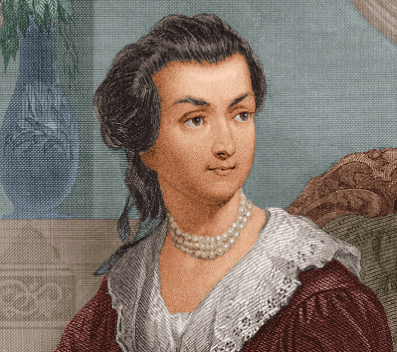This blog is dedicated to American women who achieved a first. Although my women of note come from every American era, my blog posts have all been about modern women. As Thanksgiving approaches, however, my thoughts go back to our country’s origins, so I decided to publish my first blog on a woman who is not from modern times. Abigail Adams’ achievement, first woman to live in the White House, may not seem significant. It was, on the surface, a result of her husband’s achievement and not hers. However, her partnership with her husband gives us an example of how the founding spirit of our country was able to produce so many “first women to. . .”
John and Abigail Adams were partners. They both worked; they both were engaged in politics; they both supported the revolution. John often wrote to Abigail seeking advice and Abigail freely offered her opinions.
Abigail Adams had been educated at home. She learned to read and write in the libraries of her father and maternal grandfather and exhibited interest in the classics and ancient history, philosophy and theology, government and law, and Shakespeare. When she married John at 19, she was already capable of managing finances and the overseeing the farm while John practiced law in Boston.
While the First Continental Congress met, John and Abigail corresponded about politics. John posed questions to her, and she reported on the news of the revolution. Even the Massachusetts Colony General Court solicited advice from Abigail. She was appointed, along with the governor’s wife, to question Massachusetts women about their loyalty to the British crown and to help determine who was working against the movement for independence. “You are now a politician,” her husband wrote to her.
This skill might have served her well as First Lady, but she found it difficult “to look at every word before I utter it, and to impose a silence upon myself, when I long to talk.” Newspapers recognized her influence with the President. Some lambasted the president for giving her too much influence; others lamented, when some foreign appointees did not suit them, that Mrs. Adams must not have been available for consultation. (Mrs. Adams’ absence from Washington occurred regularly as she still managed the family’s farm and business interests.)
John and Abigail Adams’ correspondence was contained in more than 1,100 letters. Abigail believed it was private correspondence but one of her grandsons published the letters in a book. When the letters were published in 1848, Abigail Adams achieved another first, the first presidential wife in a published book.
One of Abigail’s most frequently quoted letters to John is worth remembering today, “Remember the Ladies, and be more generous and favourable to them than your ancestors. Do not put such unlimited power into the hands of the Husbands. Remember all Men would be tyrants if they could. If particular care and attention is not paid to the Ladies we are determined to foment a Rebellion, and will not hold ourselves bound by any Laws in which we have no voice, or Representation.”
LEARN MORE:
Read the Adams correspondence: http://www.masshist.org/digitaladams/aea/letter/index.html
Watch the video biography at: http://www.biography.com/people/abigail-adams-9175670?page=3
QUESTION OF THE WEEK:
Abigail Adams’ prediction about women fomenting rebellion came to fruition when women sought the right to vote in the late 1880’s and again in the 1970’s when women demanded equality. Do you think another rebellion might be necessary? If so, why?


Trackbacks/Pingbacks